| Listing 1 - 10 of 15 | << page >> |
Sort by
|
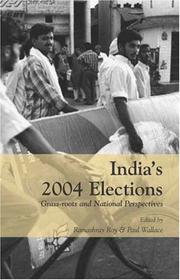
ISBN: 9788132101109 8132101103 9780761935162 0761935169 128200445X 9786612004452 Year: 2007 Publisher: New Delhi Thousand Oaks, Calif. Sage Publications
Abstract | Keywords | Export | Availability | Bookmark
 Loading...
Loading...Choose an application
- Reference Manager
- EndNote
- RefWorks (Direct export to RefWorks)
Building on their insightful work on India's 1998 and 1999 parliamentary. elections, distinguished scholars Ramashray Roy and Paul Wallace's current. book focuses on the landmark elections of 2004. Thematically divided into two. sections, the book focuses on:. - the national, theoretical and comparative perspectives on participation. of women in the electoral process, caste dynamics, religion and nationalism,. as well as federalism and factionalism. - state-specific studies of Andhra. Pradesh, Assam, Bihar, Gujarat, Meghalaya, Orissa and West Bengal. - tribal. politics, at a time when the poli
Elections --- India. --- India (Republic). --- Elections, 2004.
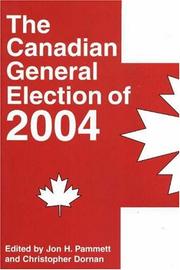
ISBN: 1770701753 1417576197 9786612809965 1282809962 1550025163 9781550025163 9781417576197 9781770701755 9781282809963 Year: 2004 Publisher: Toronto, Ont. Dundurn Group
Abstract | Keywords | Export | Availability | Bookmark
 Loading...
Loading...Choose an application
- Reference Manager
- EndNote
- RefWorks (Direct export to RefWorks)
Canada. --- Parliament of Canada --- Parlement du Canada --- Elections, 2004.
Book
Year: 2004 Publisher: [Washington, D.C] : [U.S. Dept. of State]: [Bureau of International Information Programs],
Abstract | Keywords | Export | Availability | Bookmark
 Loading...
Loading...Choose an application
- Reference Manager
- EndNote
- RefWorks (Direct export to RefWorks)
Presidents --- Political parties --- Political campaigns --- Election. --- United States. --- Elections, 2004.
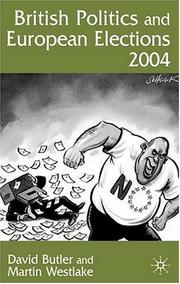
ISBN: 1403935858 9781403935854 1349518298 9786610438457 1280438452 0230508693 Year: 2004 Publisher: Hampshire : Palgrave Macmillan,
Abstract | Keywords | Export | Availability | Bookmark
 Loading...
Loading...Choose an application
- Reference Manager
- EndNote
- RefWorks (Direct export to RefWorks)
The authors present an original and authoritative account of what was involved for the United Kingdom in the contests for the European Parliament. They describe the background, the preparation by the parties, the unfolding campaigns (both nationally and regionally) and the results. They discuss the election's short-term effects and its long-term implications.
Elections --- European Parliament --- Elections, 2004 --- Great Britain --- Grande-Bretagne --- Politics and government --- Politique et gouvernement --- Elections, 2004.
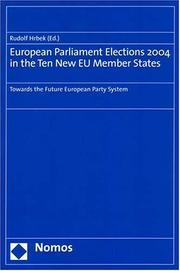
ISBN: 3832914463 9783832914462 Year: 2005 Publisher: Baden-Baden: Nomos,
Abstract | Keywords | Export | Availability | Bookmark
 Loading...
Loading...Choose an application
- Reference Manager
- EndNote
- RefWorks (Direct export to RefWorks)
It is a premise of this book that European integration and EU politics will become more and more politicised. Political parties will, therefore, play a more important role in EU governance. The book envisages the European party system after enlargement, with political parties from the ten new EU member states as new participants and actors in the party arena of the EU. The ten country chapters (authors are experts, most of them from the respective country) deal with the attitudes and activities of political parties towards European integration and the EU (focussing on referendums on EU membership and on the 2004 European elections) and with the affiliations of these parties to the party groups in the European Parliament and the party organizations at European level. The annex informs on parties in the ten new EU member states, on the composition of the political groups in the EP and on the results of the referendums on EU membership and the EP elections in the respective countries
European Parliament --- Elections, 2004 --- European Union countries --- Pays de l'Union européenne --- Politics and government --- Politique et gouvernement --- Political parties --- Elections, 2004. --- Pays de l'Union européenne
Book
ISSN: 15259730 ISBN: 9780820481739 0820481734 9781433102431 1433102439 Year: 2008 Volume: 10 Publisher: New York : Peter Lang,
Abstract | Keywords | Export | Availability | Bookmark
 Loading...
Loading...Choose an application
- Reference Manager
- EndNote
- RefWorks (Direct export to RefWorks)
Elections --- Elections dans la presse --- Press coverage --- European Parliament --- European Union --- Elections, 2004. --- Elections, 2004 --- Press coverage. --- Membership. --- Elections - European Union countries --- Elections - European Union countries - Press coverage
Book
ISBN: 2724686578 Year: 2005 Publisher: Paris (117 Boulevard Saint-Germain 75006) : Presses de Sciences Po,
Abstract | Keywords | Export | Availability | Bookmark
 Loading...
Loading...Choose an application
- Reference Manager
- EndNote
- RefWorks (Direct export to RefWorks)
Plus abstentionniste, plus conservateur, moins régionaliste. Tel est le portrait qui ressort de l'analyse des dernières élections au Parlement européen des vingt-cinq pays de l'Union en juin 2004. On ne peut plus aujourd'hui parler de « déficit démocratique » de l'Europe. Sa construction politique est prise en charge par les électeurs. Pour la sixième fois, le Parlement européen est issu d'une élection au suffrage universel direct, tandis que les référendums se succèdent. Un vote européen se fait jour, plus abstentionniste, plus conservateur, moins régionaliste. Mettre en lumière les tendances issues des dernières élections au Parlement européen des vingt-cinq pays de l'Union en juin 2004, mesurer l'impact des nouveaux entrants, le nouvel équilibre des forces et des alliances au sein du Parlement européen paraît d'autant plus essentiel que les conséquences des « non » français et néerlandais semblent impossibles à prévoir. Enfin, Pascal Perrineau livre ses premières analyses du « non » français. Trois variables nationales annonçaient ce « non » : un gouvernement national impopulaire, un pessimisme économique et social et un sentiment avéré de craintes vis-à-vis de l'autre. L'issue du 29 mai 2005 ne pouvait qu'être négative. Sur aucun de ces trois « fondamentaux », la France ou les Pays-Bas n'étaient en position pour que le « oui » l'emporte, à la différence de l'Espagne dont le vote est resté européen, hors des considérations purement nationales et des inquiétudes qui taraudent le corps électoral français.
Book
ISBN: 9780415509480 0415509483 9780415556750 0415556759 Year: 2010 Publisher: London: Routledge,
Abstract | Keywords | Export | Availability | Bookmark
 Loading...
Loading...Choose an application
- Reference Manager
- EndNote
- RefWorks (Direct export to RefWorks)
This book reflects on the questions raised by the European Election Study 2004 whose analytical focus was on the legitimacy of EU politics after Eastern enlargement. It also assesses the dynamics and the contents of the campaign, on the determinants of the extremely low turnout in the new countries, and on the reasons of voter choice in West and East. The book also examines the first European Parliament election after the post-communist countries of Eastern Europe joined the European Union. The central question is: what has changed? Are the voters in the new member countries different and if so, why? Did the Union suffer from a loss of democratic legitimacy after Eastern enlargement? Each chapter is empirical-analytical; most are based on the post-election surveys of the group that were conducted in all but one of the 25 member countries, others focus on the results of content analyses of news media and party manifestos. This book was published as a special issue of the Journal of European Integration.
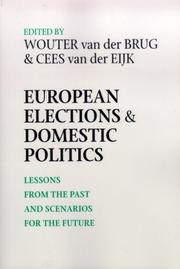
ISBN: 9780268043698 0268043698 Year: 2007 Publisher: Notre Dame, Ind. : University of Notre Dame Press,
Abstract | Keywords | Export | Availability | Bookmark
 Loading...
Loading...Choose an application
- Reference Manager
- EndNote
- RefWorks (Direct export to RefWorks)
Elections --- European Parliament --- European Union. --- Elections, 2004. --- European Union countries --- Pays de l'Union européenne --- Politics and government. --- Politique et gouvernement
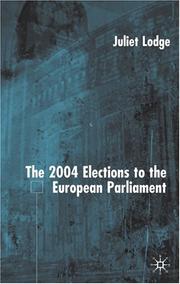
ISBN: 1403935173 1403935181 9781403935182 9781403935175 9786610565689 1280565683 023052382X Year: 2005 Publisher: Hampshire : Palgrave Macmillan,
Abstract | Keywords | Export | Availability | Bookmark
 Loading...
Loading...Choose an application
- Reference Manager
- EndNote
- RefWorks (Direct export to RefWorks)
Twenty-five years have passed since the first Euro-elections. The 6th elections to the European Parliament are marked by the participation of 10 new states from central, Eastern and South Eastern Europe, the conclusions of the 2003-02 IGC on a constitution for the new Europe, referenda on the constitution and on accession to the EU and the Euro, amid deep division over the EU's external role in the wake of the Iraq war and subsequent relations with the US. This book includes results from all member states, together with full coverage of the campaigns, and the key political issues of the election.
Government --- European Union --- European Parliament --- Elections, 2004 --- European Union countries --- Pays de l'Union européenne --- Politics and government --- Politique et gouvernement --- #SBIB:054.AANKOOP --- #SBIB:327.7H221 --- #SBIB:324H42 --- Europees Parlement --- Politieke structuren: verkiezingen --- Pays de l'Union européenne --- European Communities. Parliament --- Elections, 2004.
| Listing 1 - 10 of 15 | << page >> |
Sort by
|

 Search
Search Feedback
Feedback About UniCat
About UniCat  Help
Help News
News